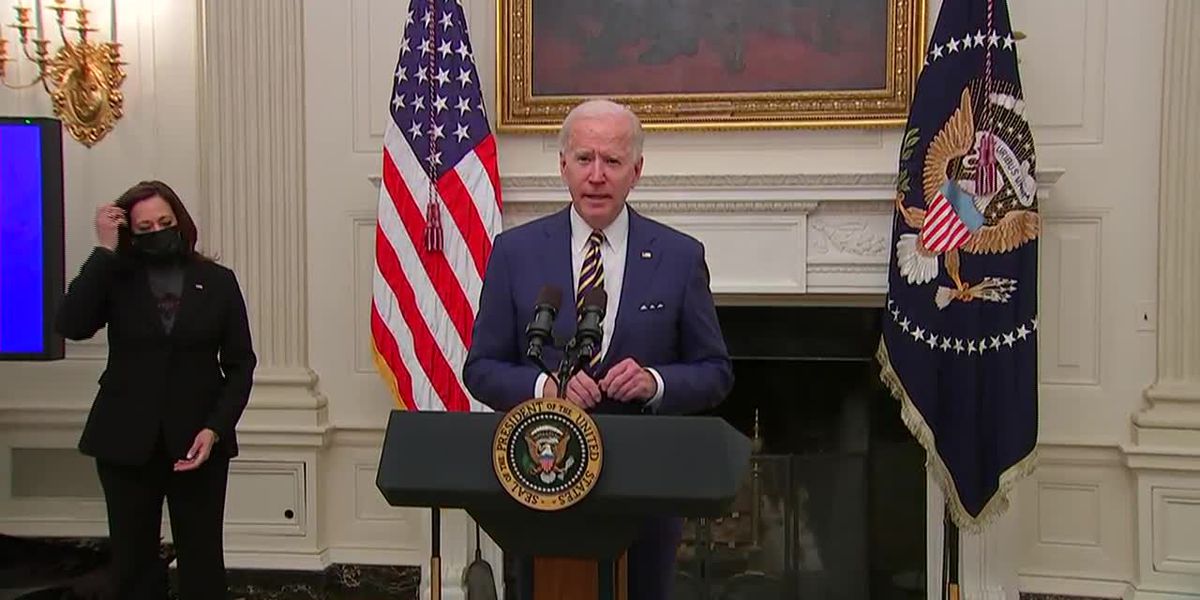President Biden is facing a dilemma that also confounded both of his immediate predecessors: to stay or to go in Afghanistan.
Biden inherited a May deadline from the Trump administration to withdraw all U.S. troops from Afghanistan. Experts are warning that doing so could have dire consequences for Afghan and U.S. security, but Biden also faces domestic political pressures from those who say it is far past time to end America’s longest war.
During the presidential campaign, Biden promised to end so-called forever wars, but also said he would leave a small number of special forces in countries such as Afghanistan to conduct counterterrorism missions.
Since taking office, the Biden administration has said only that Afghanistan is one of the many policies it is reviewing in its early days. But the administration could be forced to make a decision sooner rather than later with a key NATO meeting in two weeks.
“As an administration, we have to decide, and we are reviewing, what we’re doing in Afghanistan,” Pentagon press secretary John Kirby said at a Friday briefing. “We’re reviewing the Doha agreement. We’re reviewing the compliance with the Doha agreement. We have recommitted ourselves to a political solution. We don’t believe there’s a military solution. And that process of review is ongoing.”
Kirby also noted the mid-February NATO defense ministerial that Defense Secretary Lloyd Austin will participate in, saying “obviously” Afghanistan “will be a key topic of discussion inside that venue, as well.”
U.S. forces have been in Afghanistan since they invaded in response to the Sept. 11, 2001, terrorist attacks.
After inheriting the war from former President George W. Bush, former President Obama at first surged thousands of more troops into a war he felt was neglected after the Iraq War started. But Obama then declared an end to combat operations in 2014 with hopes to withdraw by the end of his presidency.
Ultimately, though, Obama reversed plans to withdraw on the advice of his military advisers, leaving office with about 8,000 troops in Afghanistan.
Former President Trump railed against foreign entanglements as part of his “America First” agenda. But he, too, at first sent thousands more troops back to Afghanistan.
But Trump also initiated direct talks with the Taliban, resulting in an agreement that was signed in Doha, Qatar, last year that dictates a full U.S. military withdrawal by May if the insurgents uphold certain commitments.
U.S. military officials repeatedly said the Taliban was not upholding its commitments. But Trump continued to draw down anyway, leaving office with about 2,500 troops there — the lowest level since 2001, but still short of his desire for a complete withdrawal.
Under the agreement, the Taliban is supposed to deny safe haven to terrorist groups intent on attacking the West, including al Qaeda. U.S. officials also expect the Taliban to reduce attacks on Afghan forces and participate in good-faith peace talks with the Afghan government.
The Taliban has yet to break with al Qaeda, according to U.S. military officials. And far from reducing violence, the Taliban has stepped up its attacks on Afghan forces.
From October to December, enemy-initiated attacks in Afghanistan were higher than during the same period in 2019, according to a Special Inspector General for Afghanistan Reconstruction report released Monday. Among the trends in the Taliban’s violence at the end of 2020 was “an uptick in targeted assassinations of Afghan government officials, civil-society leaders and journalists,” according to the report.
In particular, the number of attacks in Kabul was “much higher” than the previous year, U.S. Forces Afghanistan told the inspector general. The increase includes attacks from both the Taliban and Afghanistan’s ISIS affiliate.
Meanwhile, intra-Afghan talks have been halting, at best. The start of the talks was delayed six months amid a political dispute in Kabul and hesitation from the Afghan government at a prisoner swap. Even after the two sides first sat down in September, it took until December to agree on just the procedures for the negotiations.
With the Taliban having yet to live up to its commitments, a bipartisan panel commissioned by Congress recommended this past week Biden indefinitely delay the May withdrawal. While a delay does risk the Taliban increasing violence further, the Afghanistan Study Group warned the country “is highly likely to fall into chaos” if the administration pushes forward with a “calculated” withdrawal or “create the sort of threats that imperil U.S. security” if it decides on a quick withdrawal.
Retired Gen. Joseph Dunford, former chairman of the Joint Chiefs of Staff and a co-chair of the panel, said he is hoping the Biden administration’s eventual decision will “move beyond the narrative of what’s been characterized as a forever war.”
“The fact of the matter is we’ve got 2,500 Americans on the ground right now, and the strategy is by, with and through the Afghan National Defense Security Forces. So I think that’s an important part of the message in getting bipartisan support,” he told reporters. “We’re already down to 2,500, so we made it clear to everybody that our patience is not infinite.”
But Biden will also have to contend with members of his own party who say it is time to leave Afghanistan.
Rep. Ro Khanna (D-Calif.) scoffed at the Afghanistan Study Group report, saying “the big names in American foreign policy have made some of the biggest mistakes of the last 20 years.”
“President Biden needs to spend less time listening to the fancy names who came out with this report, and he needs to go to places like Scranton, and listen to what people there are saying,” Khanna said in an interview. “I trust President Biden’s judgment. If he listens to people that he grew up with, that he campaigned with, that trust him, I think he will make the right judgment, as opposed to listening to the people who got us into this mess.”
Khanna advocated for withdrawing from Afghanistan with a warning to the Taliban that the United States will come back with “overwhelming” force if there is a threat to the homeland, arguing that would be a “very powerful” deterrent. Diplomacy toward an agreement between the Taliban and Afghan government should also continue, he added.
“There is no perfect solution in safeguarding peace and human rights in Afghanistan,” he said. “We have to get out and do the best we can to stand up for human rights through diplomacy, understanding that it’s not going to be perfect.”
After the release of the Afghanistan Study Group report, the State Department reiterated that a review of the U.S.-Taliban agreement is ongoing, adding that it is “deeply appreciative” of the panel’s “thoughtful work” and looks “forward to closely examining the recommendations contained in the comprehensive report.”
The Pentagon did not comment directly on the report, but likewise reiterated a review of the agreement is ongoing.
In the Pentagon’s first briefing of the Biden administration in January, Kirby also said the Taliban has “not met their commitments,” adding that “without them meeting their commitments to renounce terrorism and to stop the violent attacks on the Afghan National Security Forces, and by dint of that the Afghan people, it’s very hard to see a specific way forward for the negotiated settlement.”
On Friday, Austin spoke with Afghan President Ashraf Ghani. Kirby would not say whether the two discussed the May deadline, but said they spoke about “the importance of the peace process, and they talked about the importance of this being Afghan-led. They talked about the enduring commitment that we have to Afghanistan writ large.”













